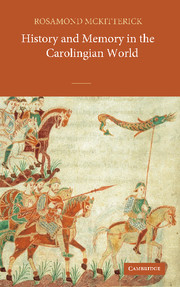
-
Select format
-
- Publisher:
- Cambridge University Press
- Publication date:
- December 2009
- July 2004
- ISBN:
- 9780511617003
- 9780521827171
- 9780521534369
- Dimensions:
- (228 x 152 mm)
- Weight & Pages:
- 0.69kg, 354 Pages
- Dimensions:
- (228 x 152 mm)
- Weight & Pages:
- 0.58kg, 354 Pages
- Subjects:
- Area Studies, History, European Studies, European History 450-1000
You may already have access via personal or institutional login- Subjects:
- Area Studies, History, European Studies, European History 450-1000
Book description
The writing and reading of history in the early Middle Ages form the key themes of this 2004 book. The primary focus is on the remarkable manifestations of historical writing in relation to historical memory in the Frankish kingdoms of the eighth and ninth centuries. It considers the audiences for history in the Frankish kingdoms, the recording of memory in new genres including narrative histories, cartularies and Libri memoriales, and thus particular perceptions of the Frankish and Christian past. It analyses both original manuscript material and key historical texts from the Carolingian period, a remarkably creative period in the history of European culture. Presentations of the past developed in this period were crucial in forming an historical understanding of the Greco-Roman and Judaeo-Christian past and, in subsequent centuries, of early medieval Europe. They also played an extraordinarily influential role in the formation of political ideologies and senses of identity within Europe.
Reviews
'This volume … raises central questions about the conscious and implicit functions of Carolingian historical texts, their setting in a broader and more fluid historical narrative, and the evidence for how they circulated. There are important demonstrations of how the manuscripts provide an amplification and a check on what a printed edition can reveal.'
Source: Institute of Historical Research
Contents
Metrics
Altmetric attention score
Full text views
Full text views help Loading metrics...
Loading metrics...
* Views captured on Cambridge Core between #date#. This data will be updated every 24 hours.
Usage data cannot currently be displayed.
Accessibility standard: Unknown
Why this information is here
This section outlines the accessibility features of this content - including support for screen readers, full keyboard navigation and high-contrast display options. This may not be relevant for you.
Accessibility Information
Accessibility compliance for the PDF of this book is currently unknown and may be updated in the future.


